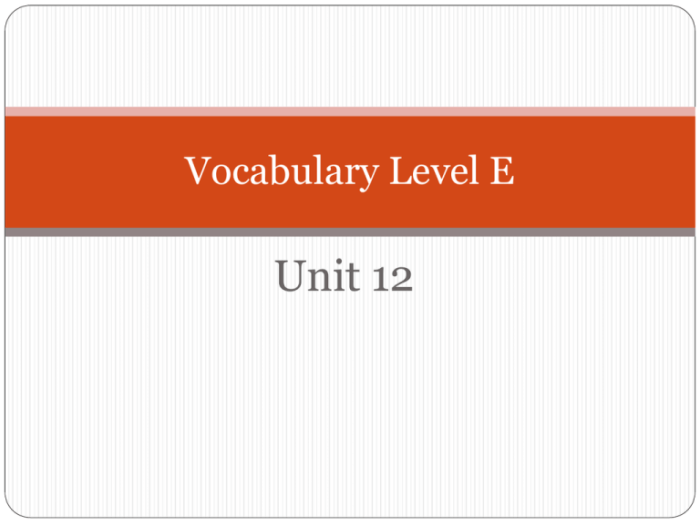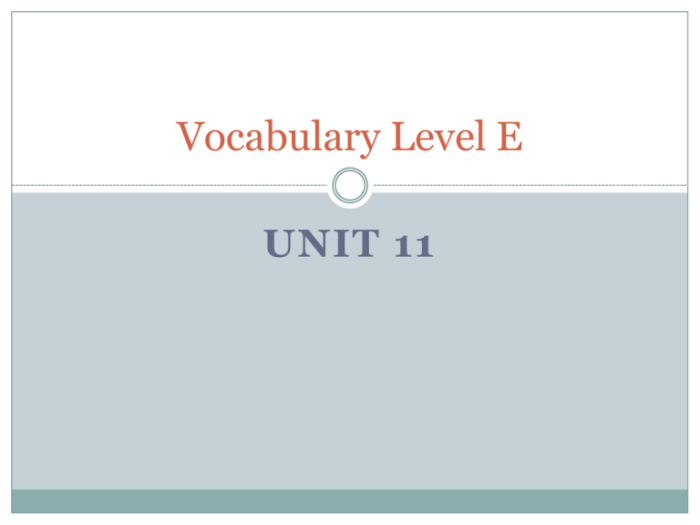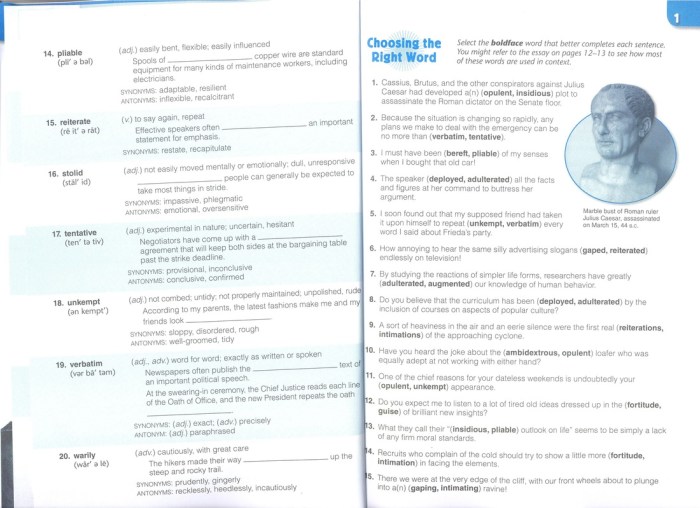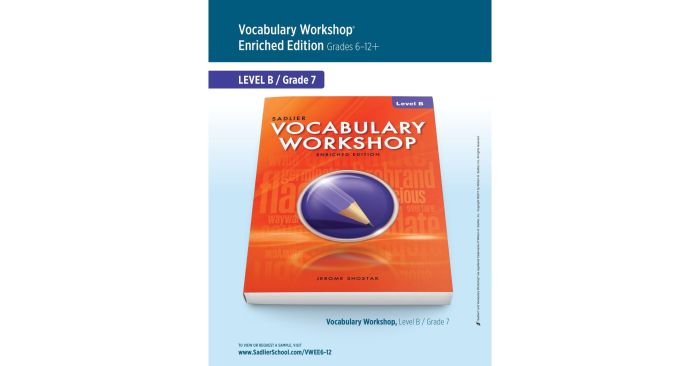Embark on a linguistic adventure with Unit 5 Vocabulary Level E, where words become your tools to paint vibrant sentences and convey your thoughts with precision. Dive into the depths of language and emerge as a wordsmith with an expanded vocabulary.
This unit offers a comprehensive exploration of word lists, definitions, usage in context, word relationships, thematic connections, assessment, and effective teaching strategies. Let’s unlock the power of words together!
Word List
Here’s a comprehensive list of all the vocabulary words included in Unit 5, Level E, categorized based on their part of speech:
These words are essential for building a strong vocabulary foundation and enhancing your communication skills.
Nouns
- Authority
- Concern
- Consciousness
- Consensus
- Discretion
- Enlightenment
- Equity
- Hypothesis
- Inference
- Insight
- Intuition
- Perception
- Perspective
- Prejudice
- Principle
- Reasoning
- Subjectivity
- Theory
Verbs
- Acknowledge
- Articulate
- Assess
- Comprehend
- Contemplate
- Criticize
- Define
- Demonstrate
- Distinguish
- Evaluate
- Explain
- Formulate
- Hypothesize
- Infer
- Interpret
- Justify
- Observe
- Perceive
- Predict
- Prove
- Reason
- Reflect
- Refute
- Support
- Synthesize
- Understand
- Verify
Adjectives
- Abstract
- Analytical
- Conceptual
- Concrete
- Critical
- Empirical
- Essential
- Fundamental
- Hypothetical
- Inherent
- Objective
- Personal
- Philosophical
- Practical
- Relevant
- Subjective
- Theoretical
Adverbs
- Accordingly
- Apparently
- Certainly
- Clearly
- Consequently
- Generally
- Moreover
- Naturally
- Obviously
- Particularly
- Possibly
- Presumably
- Probably
- Surely
- Typically
- Ultimately
Definitions and Meanings
In this section, we will delve into the precise definitions and meanings of the vocabulary words. By exploring synonyms, antonyms, and practical examples, we aim to enhance your comprehension and solidify your understanding of these terms.
Synonyms and Antonyms
Synonyms are words that share similar meanings, while antonyms represent words with opposite meanings. Identifying synonyms and antonyms can help you expand your vocabulary and improve your understanding of word relationships. For instance, the word “elated” is synonymous with “joyful,” while its antonym would be “depressed.”
Examples
Examples provide practical illustrations of how words are used in context. They help you grasp the nuances of word usage and how they contribute to the overall meaning of a sentence or passage. For example, the word “tranquil” can be illustrated with the sentence: “The serene lake, undisturbed by a ripple, reflected the tranquility of the surroundings.”By
studying the definitions, synonyms, antonyms, and examples of each vocabulary word, you will gain a comprehensive understanding of their meanings and usage, enabling you to communicate more effectively and expand your vocabulary.
Usage in Context: Unit 5 Vocabulary Level E

Using vocabulary words correctly in context is essential for effective communication. Sentences that demonstrate the correct usage of each vocabulary word can help illustrate the word’s meaning and its role in a sentence.
Sentences Demonstrating Correct Usage
- Accommodate:The hotel can accommodate up to 500 guests.
- Adversity:The team faced adversity with courage and determination.
- Apathy:The student showed apathy towards his studies.
- Audacity:The thief had the audacity to rob a bank in broad daylight.
- Benevolence:The organization’s benevolence extended to the underprivileged communities.
Understanding Word Meaning and Sentence Structure
By examining sentences that use vocabulary words correctly, we can better understand the word’s meaning and how it functions within a sentence. For example, in the sentence “The team faced adversity with courage and determination,” the word “adversity” refers to a difficult situation, and the sentence shows how the team overcame this challenge.
Practice Using Vocabulary Words
To improve your usage of vocabulary words, practice using them in your own sentences. This will help you become more comfortable with the words and their correct usage.
Unit 5 Vocabulary Level E includes words related to family and relationships. These words can be used to describe your own family, or to talk about the families of others. For example, you could use the word “sibling” to describe your brother or sister, or the word “grandparent” to describe your grandmother or grandfather.
You can learn more about the family of little feet in this article . With a strong vocabulary, you can communicate effectively about important topics like family and relationships.
Word Relationships

The vocabulary words in Unit 5 Level E exhibit a range of interconnections in terms of meaning, usage, and etymology. These relationships provide a deeper understanding of the words and their nuances, enhancing our ability to use them effectively in communication.
One prominent relationship among the words is their shared association with the concept of “proximity.” Words such as “adjacent,” “contiguous,” and “proximate” all convey the idea of being close in space or time. This shared semantic field creates a cohesive group of terms that can be used interchangeably in certain contexts.
Etymology
Etymology, the study of word origins, also reveals connections between the vocabulary words. For example, the words “adjacent” and “contiguous” both trace their roots back to the Latin word “ad,” meaning “to” or “near.” This etymological link underscores the shared meaning of these words in relation to proximity.
Usage, Unit 5 vocabulary level e
In terms of usage, the vocabulary words exhibit both similarities and differences. While words like “adjacent” and “contiguous” are often used interchangeably, there are subtle nuances that distinguish their usage. “Adjacent” typically implies a direct or immediate proximity, while “contiguous” suggests a broader or more indirect connection.
This distinction becomes evident in sentences such as “The adjacent buildings were separated by a narrow alley” and “The two countries shared a contiguous border.”
Thematic Connections

The vocabulary words in Unit 5, Level E, are connected by several underlying themes and concepts. These words are related to the idea of “complexity” and the challenges and opportunities it presents.
One theme that emerges from these words is the idea of “intricacy” and “complexity.” Words like “convolution,” “labyrinthine,” and “fractal” all suggest something that is intricate, complex, and difficult to understand. These words imply a level of complexity that can be challenging to navigate, but also potentially rewarding.
Complexity as a Challenge
Another theme that emerges from these words is the idea of complexity as a challenge. Words like “enigma,” “dilemma,” and “quandary” all suggest something that is difficult to solve or understand. These words imply a level of complexity that can be frustrating, but also potentially stimulating.
Complexity as an Opportunity
However, the vocabulary words in Unit 5, Level E, also suggest that complexity can be an opportunity. Words like “nuance,” “subtlety,” and “sophistication” all suggest something that is complex and sophisticated. These words imply a level of complexity that can be rewarding and enriching.
Assessment

To evaluate students’ understanding of the vocabulary words, a set of assessment questions should be designed. These questions should assess their knowledge of the words’ definitions, usage, and relationships.
Definitions
- Multiple-choice questions: Provide students with a list of words and ask them to choose the correct definition for each.
- Short answer questions: Ask students to provide the definition of a specific word in their own words.
- Fill-in-the-blank questions: Provide students with a sentence containing a blank and ask them to fill it with the correct vocabulary word.
Usage, Unit 5 vocabulary level e
- Sentence completion questions: Provide students with a sentence that is missing a word and ask them to complete it with the correct vocabulary word.
- Contextual questions: Provide students with a short passage and ask them to identify the vocabulary words used in the passage and explain their meaning in context.
- Paraphrasing questions: Ask students to paraphrase a sentence using one or more of the vocabulary words.
Relationships
- Synonym/antonym questions: Provide students with a vocabulary word and ask them to identify its synonym or antonym.
- Word mapping questions: Ask students to create a word map that shows the relationships between different vocabulary words.
- Semantic feature analysis questions: Ask students to identify the semantic features that are common to a group of vocabulary words.
al Strategies
Effective al strategies for teaching vocabulary in Unit 5, Level E, include using a variety of methods to engage students and reinforce learning. These strategies should focus on building students’ understanding of the words’ meanings, pronunciations, and usage in context.
Games, activities, and exercises can be used to enhance vocabulary learning. These activities should be designed to be fun and engaging, while also providing opportunities for students to practice using the new words in different contexts.
Games
- Vocabulary Charades:Write the vocabulary words on slips of paper and have students take turns acting them out while their classmates guess.
- Word Association:Say a vocabulary word and have students call out the first word that comes to mind. This helps students make connections between the new words and their existing vocabulary.
- Vocabulary Bingo:Create bingo cards with the vocabulary words on them. Students listen to the words being read aloud and mark off the words as they hear them.
Activities
- Vocabulary Journals:Have students keep a vocabulary journal where they write down the new words, their definitions, and examples of how the words are used in context.
- Word Sorts:Provide students with a list of vocabulary words and have them sort the words into different categories, such as nouns, verbs, or adjectives.
- Vocabulary Scavenger Hunts:Hide vocabulary words around the classroom and have students search for them. When they find a word, they must write down the definition or use the word in a sentence.
Exercises
- Vocabulary Quizzes:Give students regular quizzes to assess their understanding of the vocabulary words.
- Vocabulary Worksheets:Provide students with worksheets that include exercises such as fill-in-the-blank, matching, and short answer questions.
- Vocabulary Games Online:There are many online games that can help students learn vocabulary, such as crossword puzzles, word searches, and hangman.
FAQ Compilation
What is the main focus of Unit 5 Vocabulary Level E?
Expanding your vocabulary and developing a deeper understanding of word usage and relationships.
How is the vocabulary organized in the unit?
Words are categorized based on their part of speech and thematic connections.
What types of assessment questions can I expect?
Questions that test your knowledge of definitions, usage, and relationships between words.
